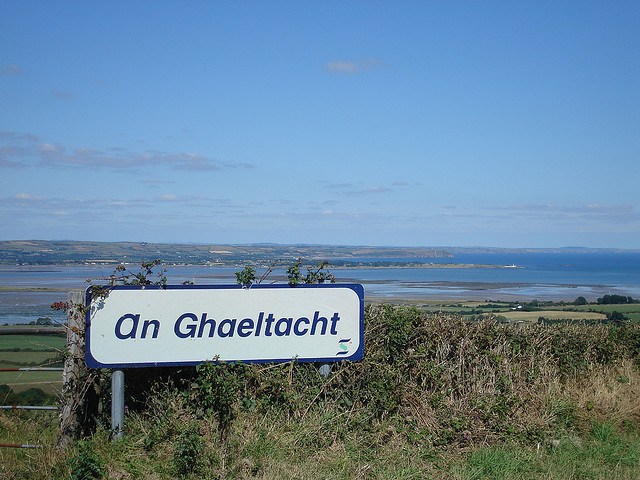International students and staff
Ireland has two official languages - Gaeilge (Irish) and English. Both of these languages are used in Trinity College every day. You will see Irish on College signage and documentation, and hear it being spoken among staff and students. On this page you will find out more about Irish and the ways that you can engage with Irish in Trinity College.
Please click here for a PDF of the Irish Language Office international orientation presentation.
A few facts about Irish
- Irish is the first official language of Ireland and an official language of the European Union
- 41% of people in the Republic of Ireland can speak Irish
- Irish is a compulsory subject here, from the beginning of primary school to the end of secondary school
- Early Irish literature is the oldest vernacular literature in Western Europe
- Modern Irish has three major dialects (Ulster, Connacht and Munster), plus a standardised written form
- An area where Irish is the main language of the community is called a gaeltacht

Gaeltacht areas are often situated along Ireland's beautiful coastline
Irish and other nations
Irish is an Indo-European, Celtic language. Celtic people once lived all across Europe, but were particularly strong in France - the name "Paris" comes from a local Celtic tribe called the "Parisii".
Irish is very closely related to Scots Gaelic and Manx, which both developed from Early Irish, and it is also related to Welsh, Breton and Cornish. The Irish language's own word for itself, "Gaeilge", comes from a Welsh word meaning "wild man", i.e. Irishman...
***
Speakers of many languages have come to Ireland throughout history. The following languages have all had a strong influence on Irish:
| Language | Brought by... | Examples of influence (other language / Irish) |
| Latin | the Catholic Church | Deus (God) / Dia Tu (You) / Tú |
| French | the Normans | Garcon (boy) / Gasúr Chambre (room) / Seomra |
| English | the English | Hi! / Haigh! Printer / Printéir |
Irish has also influenced other languages in return, including English. For example, the English word "galore" comes from the Irish "go leor", meaning "plenty". Many of the unique phrases that Irish people use when speaking English are direct translations from the Irish language - for example, the famous "'Tis" is used because Irish does not have a single word for "yes" or "no".
***
Speakers of Irish have emigrated to many other countries, particularly the United Kingdom, the United States, Canada, New Zealand and Australia. These countries (and others) have active groups of Irish speakers and promoters today, and Irish is taught at third-level educational institutions all over the world. Many people come to Ireland from other countries to learn Irish and to spend time in gaeltacht areas.
American and Canadian learners of Irish: Video courtesy of ICUF
Irish in Trinity College
As an international student or staff member in Trinity College, you have many opportunities to learn the Irish language and to enjoy traditional Irish culture:
- Our free Irish classes at Level A1 cater for complete beginners. Students and staff from many different countries attend these classes each term. The courses are compatible with the syllabus of the European Certificate in Irish (TEG), an internationally-recognised qualification. Specific support is given to people who want to gain this qualification.
- The Department of Irish offers modules through the medium of English, including modules in Early Irish. Their module "Irish Language and Literature" is designed specifically for visiting students, and it is suitable for anyone who is interested in the history, folklore and literature of the Irish language, but who has never studied those topics before.
- The Irish Language Office, TradSoc (the traditional music society) and the Cumann Gaelach (a student society for Irish language and culture) organise various events during the year that are suitable for people with only a little Irish - e.g. céilí dancing, traditional sports, music sessions and language exchange evenings.
Get started
Here are a few Irish phrases that you can use today!
- Dia duit - Hello
- Conas atá tú? - How are you?
- Tá mé go maith - I'm well
- _____ is ainm dom - My name is _____
- Le do thoil - Please
- Go raibh maith agat - Thank you
- Sláinte! - Cheers!
- Slán - Goodbye
For help with pronunciation, please visit abair.ie, where you can type in Irish words and phrases and hear a native speaker's pronunciation. If you would like to learn more, please contact the Irish Language Officer (gaeloifig@tcd.ie), who can advise you on learning materials and classes.